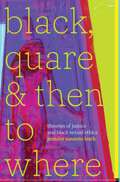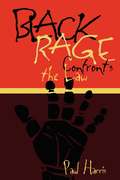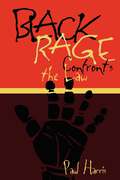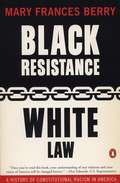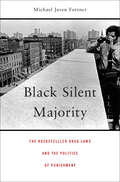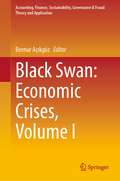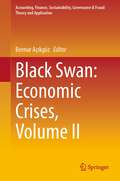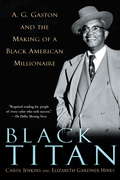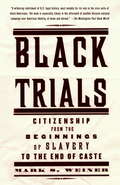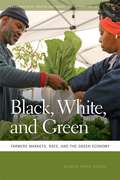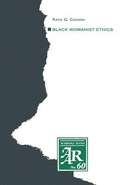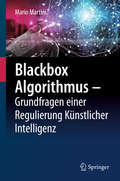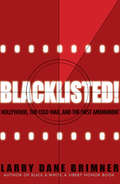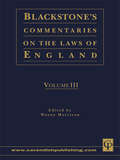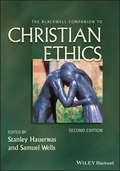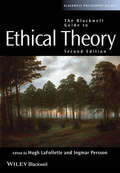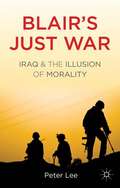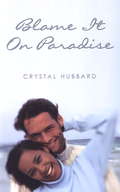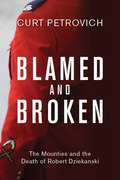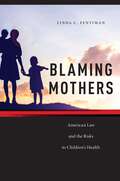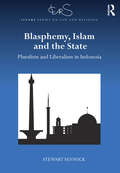- Table View
- List View
Black, Quare, and Then to Where: Theories of Justice and Black Sexual Ethics (Religious Cultures of African and African Diaspora People)
by jennifer susanne leathIn Black, Quare, and Then to Where jennifer susanne leath explores the relationship between Afrodiasporic theories of justice and Black sexual ethics through a womanist engagement with Maât the ancient Egyptian deity of justice and truth. Maât took into account the historical and cultural context of each human’s life, thus encompassing nuances of politics, race, gender, and sexuality. Arguing that Maât should serve as a foundation for reconfiguring Black sexual ethics, leath applies ancient Egyptian moral codes to quare ethics of the erotic, expanding what relationships and democratic practices might look like from a contemporary Maâtian perspective. She also draws on Pan-Africanism and examines the work of Alice Walker, E. Patrick Johnson, Cheikh Anta Diop, Sylvia Wynter, Sun Ra, and others. She shows that together these thinkers and traditions inform and expand the possibilities of Maâtian justice with respect to Black sexual experiences. As a moral force, leath contends, Maât opens new possibilities for mapping ethical frameworks to understand, redefine, and imagine justices in the United States.
Black Rage Confronts the Law (Critical America #19)
by Paul HarrisIn 1971, Paul Harris pioneered the modern version of the black rage defense when he successfully defended a young black man charged with armed bank robbery. Dubbed one of the most novel criminal defenses in American history by Vanity Fair, the black rage defense is enormously controversial, frequently dismissed as irresponsible, nothing less than a harbinger of anarchy. Consider the firestorm of protest that resulted when the defense for Colin Ferguson, the gunman who murdered numerous passengers on a New York commuter train, claimed it was considering a black rage defense. In this thought-provoking book, Harris traces the origins of the black rage defense back through American history, recreating numerous dramatic trials along the way. For example, he recounts in vivid detail how Clarence Darrow, defense attorney in the famous Scopes Monkey trial, first introduced the notion of an environmental hardship defense in 1925 while defending a black family who shot into a drunken white mob that had encircled their home. Emphasizing that the black rage defense must be enlisted responsibly and selectively, Harris skillfully distinguishes between applying an environmental defense and simply blaming society, in the abstract, for individual crimes. If Ferguson had invoked such a defense, in Harris's words, it would have sent a superficial, wrong-headed, blame-everything-on-racism message. Careful not to succumb to easy generalizations, Harris also addresses the possibilities of a white rage defense and the more recent phenomenon of cultural defenses. He illustrates how a person's environment can, and does, affect his or her life and actions, how even the most rational person can become criminally deranged, when bludgeoned into hopelessness by exploitation, racism, and relentless poverty.
Black Rage Confronts the Law (Critical America #19)
by Paul HarrisTraces the origins of the black rage defense in criminal court historyIn 1971, Paul Harris pioneered the modern version of the black rage defense when he successfully defended a young black man charged with armed bank robbery. Dubbed one of the most novel criminal defenses in American history by Vanity Fair, the black rage defense is enormously controversial, frequently dismissed as irresponsible, nothing less than a harbinger of anarchy. Consider the firestorm of protest that resulted when the defense for Colin Ferguson, the gunman who murdered numerous passengers on a New York commuter train, claimed it was considering a black rage defense. In this thought-provoking book, Harris traces the origins of the black rage defense back through American history, recreating numerous dramatic trials along the way. For example, he recounts in vivid detail how Clarence Darrow, defense attorney in the famous Scopes Monkey trial, first introduced the notion of an environmental hardship defense in 1925 while defending a black family who shot into a drunken white mob that had encircled their home. Emphasizing that the black rage defense must be enlisted responsibly and selectively, Harris skillfully distinguishes between applying an environmental defense and simply blaming society, in the abstract, for individual crimes. If Ferguson had invoked such a defense, in Harris's words, it would have sent a superficial, wrong-headed, blame-everything-on-racism message. Careful not to succumb to easy generalizations, Harris also addresses the possibilities of a white rage defense and the more recent phenomenon of cultural defenses. He illustrates how a person's environment can, and does, affect his or her life and actions, how even the most rational person can become criminally deranged, when bludgeoned into hopelessness by exploitation, racism, and relentless poverty.
Black Resistance, White Law: A History of Constitutional Racism in America
by Mary Frances BerryHow the government has used the Constitution to deny black Americans their legal rights From the arrival of the first twenty slaves in Jamestown to the Howard Beach Incident of 1986, Yusef Hawkins, and Rodney King, federal law enforcement has pleaded lack of authority against white violence while endorsing surveillance of black rebels and using "constitutional" military force against them. In this groundbreaking study, constitutional scholar Mark Frances Berry analyzes the reasons why millions of African Americans whose lives have improved enormously, both socially and economically, are still at risk of police abuse and largely unprotected from bias crimes.
Black Silent Majority: The Rockefeller Drug Laws and the Politics of Punishment
by Michael Javen FortnerCurrent anti-drug policies are based on a set of controversial laws first adopted in New York in the early 1970s and championed by the state’s Republican governor, Nelson Rockefeller. Fortner traces how many blacks in New York came to believe that the rehabilitation-focused liberal policies of the 1960s had failed. Faced with economic malaise and rising rates of addiction and crime, they blamed addicts and pushers. By 1973, the outcry from grassroots activists and civic leaders in Harlem calling for drastic measures presented Rockefeller with a welcome opportunity to crack down on crime and boost his political career. New York became the first state to mandate long prison sentences for selling or possessing narcotics. Black Silent Majority lays bare the tangled roots of a pernicious system. America’s drug policies, while in part a manifestation of the conservative movement, are also a product of black America’s confrontation with crime and chaos in its own neighborhoods.
Black Silent Majority: The Rockefeller Drug Laws and the Politics of Punishment
by Michael Javen FortnerAggressive policing and draconian sentencing have disproportionately imprisoned millions of African Americans for drug-related offenses. Michael Javen Fortner shows that in the 1970s these punitive policies toward addicts and pushers enjoyed the support of many working-class and middle-class blacks, angry about the chaos in their own neighborhoods.
Black Swan: Economic Crises, Volume I (Accounting, Finance, Sustainability, Governance & Fraud: Theory and Application)
by Bernur AçıkgözThis book presents to the reader the economic, fiscal and financial crises in world history that have had a great impact on the entire world and the fiscal measures taken by governments to combat each crisis since the 1600s in chronological order. Such events are often described as Black Swans, a concept introduced by economist and risk analyst Nassim Nicholas Taleb in the book Fooled By Randomness in 2001, in reference to events that were thought to be impossible but had a huge impact when they did happen.The first part of the book discusses the crisis models in order to allow the reader to better understand the financial, fiscal and economic crises that are detailed in the following chapters. Each chapter starts with an overview of the crisis in question followed by an analysis of the impact on the affected countries. They go on to highlight the causes of the crisis in question, the fiscal and financial measures employed to recover from it and ends on a description of the post-crisis period.Given the profusion of black swan events that the 21st century has already witnessed, this book would be a valuable read for academics and students of economics as well as practitioners and policy makers.
Black Swan: Economic Crises, Volume II (Accounting, Finance, Sustainability, Governance & Fraud: Theory and Application)
by Bernur AçıkgözThis book continues the discussion from Volume I on economic, fiscal, and financial crises in world history that have had a great impact on the entire world and the fiscal measures taken by governments to combat each crisis. Such events are often described as black swans, a concept introduced by Economist and Risk Analyst Nassim Nicholas Taleb in the book Fooled By Randomness in 2001, in reference to events that were thought to be impossible but had a huge impact when they did happen.The beginning of this book notes that crises are catastrophic periods when the consequences of economic mistakes made by governments are reflected to the public. Although economic crises are seen as opportunities in some cases, they have created a burden for the people. Some economic crises even triggered the world war. A recent example, Adolf Hitler, was seen as a hope of salvation in Germany due to the Great Depression and was brought to power.The twentieth century, when two great world wars took place on the stage of history, is the witness of major economic crises as well as wars. These crises have caused social and economic paradigm shifts to be experienced much faster and more effectively than the previous centuries. The transformation of the demand-oriented economic understanding created by the Great Depression in 1929 into an interventionist social state understanding, especially after the World War Two, increased the intervention of states in the socioeconomic field. In this period, the reconstruction of the countries, the development of social welfare services, the assurance of human rights, the acceleration of industrialization and development, and the economic growth and income growth of the countries resulted in the golden age enjoyed by the societies of the period.The interventionist social state, seen as a prescription and opportunity in the past crisis, was one of the cornerstones of the crisis in the last quarter of the century in the 1970s. Against interventionism, with the rise of neo-liberalism, financial liberalization, information society, and technological discoveries, globalization has become the new phenomenon of the age. This book examines in detail the causes, occurrences, and results of the twentieth-century crises.
Black Titan: A.G. Gaston and the Making of a Black American Millionaire
by Carol Jenkins Elizabeth Gardner HinesThe grandson of slaves, born into poverty in 1892 in the Deep South, A. G. Gaston died more than a century later with a fortune worth well over $130 million and a business empire spanning communications, real estate, and insurance. Gaston was, by any measure, a heroic figure whose wealth and influence bore comparison to J. P. Morgan and Andrew Carnegie. Here, for the first time, is the story of the life of this extraordinary pioneer, told by his niece and grandniece, the award-winning television journalist Carol Jenkins and her daughter Elizabeth Gardner Hines.Born at a time when the bitter legacy of slavery and Reconstruction still poisoned the lives of black Americans, Gaston was determined to make a difference for himself and his people. His first job, after serving in the celebrated all-black regiment during World War I, bound him to the near-slavery of an Alabama coal mine--but even here Gaston saw not only hope but opportunity. He launched a business selling lunches to fellow miners, soon established a rudimentary bank--and from then on there was no stopping him. A kind of black Horatio Alger, Gaston let a single, powerful question be his guide: What do our people need now? His success flowed from an uncanny genius for knowing the answer. Combining rich family lore with a deep knowledge of American social and economic history, Carol Jenkins and Elizabeth Hines unfold Gaston's success story against the backdrop of a century of crushing racial hatred and bigotry. Gaston not only survived the hardships of being black during the Depression, he flourished, and by the 1950s he was ruling a Birmingham-based business empire. When the movement for civil rights swept through the South in the late 1950s and early 1960s, Gaston provided critical financial support to many activists.At the time of his death in 1996, A. G. Gaston was one of the wealthiest black men in America, if not the wealthiest. But his legacy extended far beyond the monetary. He was a man who had proved it was possible to overcome staggering odds and make a place for himself as a leader, a captain of industry, and a far-sighted philanthropist. Writing with grace and power, Jenkins and Hines bring their distinguished ancestor fully to life in the pages of this book. Black Titan is the story of a man who created his own future--and in the process, blazed a future for all black businesspeople in America.From the Hardcover edition.
Black Titan: A. G. Gaston and the Making of a Black American Millionaire
by Carol Jenkins Elizabeth Gardner HinesThe grandson of slaves, born into poverty in 1892 in the Deep South, A. G. Gaston died more than a century later with a fortune worth well over $130 million and a business empire spanning communications, real estate, and insurance. Gaston was, by any measure, a heroic figure whose wealth and influence bore comparison to J. P. Morgan and Andrew Carnegie. Here, for the first time, is the story of the life of this extraordinary pioneer, told by his niece and grandniece, the award-winning television journalist Carol Jenkins and her daughter Elizabeth Gardner Hines. Born at a time when the bitter legacy of slavery and Reconstruction still poisoned the lives of black Americans, Gaston was determined to make a difference for himself and his people. His first job, after serving in the celebrated all-black regiment during World War I, bound him to the near-slavery of an Alabama coal mine—but even here Gaston saw not only hope but opportunity. He launched a business selling lunches to fellow miners, soon established a rudimentary bank—and from then on there was no stopping him. A kind of black Horatio Alger, Gaston let a single, powerful question be his guide:What do our people need now?His success flowed from an uncanny genius for knowing the answer. Combining rich family lore with a deep knowledge of American social and economic history, Carol Jenkins and Elizabeth Hines unfold Gaston’s success story against the backdrop of a century of crushing racial hatred and bigotry. Gaston not only survived the hardships of being black during the Depression, he flourished, and by the 1950s he was ruling a Birmingham-based business empire. When the movement for civil rights swept through the South in the late 1950s and early 1960s, Gaston provided critical financial support to many activists. At the time of his death in 1996, A. G. Gaston was one of the wealthiest black men in America, if notthewealthiest. But his legacy extended far beyond the monetary. He was a man who had proved it was possible to overcome staggering odds and make a place for himself as a leader, a captain of industry, and a far-sighted philanthropist. Writing with grace and power, Jenkins and Hines bring their distinguished ancestor fully to life in the pages of this book. Black Titanis the story of a man who created his own future—and in the process, blazed a future for all black businesspeople in America.
Black Trials: Citizenship from the Beginnings of Slavery to the End of Caste
by Mark WeinerTo examine race relations and American notions of civic inclusiveness, Weiner (law, Rutgers School of Law) analyzes 14 important cases that forced the legal system and the public to reconsider the place of blacks in America. He considers famous historical cases, such as the John Brown and Scottsboro Boys trials, and less known and more recent events, such as Anita Hill's testimony at the Clarence Thomas hearing. In his final chapter, Weiner posits that the liberal vision of racial civic inclusion has been weakened by the loss of religion's emotional force. Annotation ©2004 Book News, Inc. , Portland, OR (booknews. com)
Black, White, And Green: Farmers Markets, Race, And The Green Economy
by Alison Hope Alkon Deborah Cowen Nik Heynen Melissa WrightFarmers markets are much more than places to buy produce. According to advocates for sustainable food systems, they are also places to "vote with your fork" for environmental protection, vibrant communities, and strong local economies. Farmers markets have become essential to the movement for food-system reform and are a shining example of a growing green economy where consumers can shop their way to social change. <p><p> Black, White, and Green brings new energy to this topic by exploring dimensions of race and class as they relate to farmers markets and the green economy. With a focus on two Bay Area markets--one in the primarily white neighborhood of North Berkeley, and the other in largely black West Oakland--Alison Hope Alkon investigates the possibilities for social and environmental change embodied by farmers markets and the green economy. <p> Drawing on ethnographic and historical sources, Alkon describes the meanings that farmers market managers, vendors, and consumers attribute to the buying and selling of local organic food, and the ways that those meanings are raced and classed. She mobilizes this research to understand how the green economy fosters visions of social change that are compatible with economic growth while marginalizing those that are not. <p> Black, White, and Green is one of the first books to carefully theorize the green economy, to examine the racial dynamics of food politics, and to approach issues of food access from an environmental-justice perspective. In a practical sense, Alkon offers an empathetic critique of a newly popular strategy for social change, highlighting both its strengths and limitations.
Black Womanist Ethics
by Katie G. CannonThis study articulates the distinctive moral character of the Afro-American women's community. Beginning with a reconstructive history of the Afro-American woman's situation in America, Katie G. Cannon goes on to trace the emergence of the Black woman's literary tradition and explain its importance in expressing the moral wisdom of Black women. The life and work of Zora Neale Hurston are examined in detail for her unique contributions to the moral tradition of the Afro-American woman. A final chapter initiates a promising exchange between the works of Hurston and those of Howard Thurman and Martin Luther King, Jr.
Black Women and International Law
by Jeremy I. LevittFrom Compton to Cairo, Bahia to Brixton, black women have been disproportionally affected by poverty, illiteracy, unemployment, discrimination and violence. Despite being one of the largest and geographically dispersed groups in the world, they are rarely referenced or considered as a subject of analysis in international law literature. Thus, it is vital that scholars refashion global discourse by re-conceptualizing international law and relations from their unique experiences and perspectives. This collection covers a broad range of topics and issues that examine the complex interactions - as subjects and objects - between black women and international law. The book critically explores the manifold relationship between them with a view toward highlighting the historic and contemporary ways in which they have influenced and been influenced by transnational law, doctrine, norms, jurisprudence, public policy, public discourse and global governance. It purports to unearth old law and fashion new paradigms born out of the experiences of black women.
Blackbox Algorithmus – Grundfragen einer Regulierung Künstlicher Intelligenz
by Mario MartiniDieses Buch liefert eine rechtswissenschaftliche Analyse der Chancen und Gefahren algorithmenbasierter Verfahren. Algorithmen, die im Maschinenraum moderner Softwareanwendungen werkeln, sind zu zentralen Steuerungsinstanzen der digitalen Gesellschaft avanciert. Immer nachhaltiger beeinflussen sie unser Leben. Ihre Funktionsweise gleicht aber teilweise einer Blackbox. Die in ihr schlummernden Risiken zu bändigen, fordert die Rechtsordnung heraus. Das Buch beleuchtet die gesellschaftlichen Gefahren einer zunehmenden gesellschaftlichen Steuerung durch Algorithmen und entwickelt erste Regulierungsideen, mit deren Hilfe sich die Wertschöpfungspotenziale automatisierter digitaler Prozesse mit den Grundwerten der Rechtsordnung versöhnen lassen.
Blacklisted!: Hollywood, the Cold War, and the First Amendment
by Larry Dane BrimnerSibert award-winning author Larry Dane Brimner follows in vivid detail the story of nineteen men from the film industry who were investigated for suspected communist ties during the Cold War, and the ten who were blacklisted for standing up for their First Amendment rights and refusing to cooperate. World War II is over, but tensions between communist Soviet Union and the U.S. are at an all-time high. In America, communist threats are seen everywhere and a committee is formed in the nation’s capital to investigate those threats. Larry Dane Brimner follows the story of nineteen men—all from the film industry—who are summoned to appear before the House of Representatives Committee on Un-American Activities. All nineteen believe that the committee’s investigations into their political views and personal associations are a violation of their First Amendment rights. When the first ten of these men refuse to give the committee the simple answers it wants, they are cited for contempt of Congress and blacklisted. <P><P>Brimner brings the story of the trial and its consequences to life, giving readers an in-depth look at what it’s like to fight for the most basic of our Constitutional rights. The book includes an author’s note, a bibliography, source notes, and an index, as well as archival photographs, documents, cartoons, images, and quotations from the accused and their accusers.
Blackstone's Commentaries on the Laws of England Volumes I-IV
by Wayne MorrisonFirst published in 2001. Routledge is an imprint of Taylor & Francis, an informa company.
The Blackwell Companion to Christian Ethics
by Stanley Hauerwas Samuel WellsFeaturing updates, revisions, and new essays from various scholars within the Christian tradition, The Blackwell Companion to Christian Ethics, Second Edition reveals how Christian worship is the force that shapes the moral life of Christians.Features new essays on class, race, disability, gender, peace, and the virtuesIncludes a number of revised essays and a range of new authorsThe innovative and influential approach organizes ethical themes around the shape of Christian worshipThe original edition is the most successful to-date in the Companions to Religion series
The Blackwell Guide to Ethical Theory
by Hugh Lafollette Ingmar PerssonBuilding on the strengths of the highly successful first edition, the extensively updated Blackwell Guide to Ethical Theory presents a complete state-of-the-art survey, written by an international team of leading moral philosophers. A new edition of this successful and highly regarded Guide, now reorganized and updated with the addition of significant new materialIncludes 21 essays written by an international team of leading philosophersExtensive, substantive essays develop the main arguments of all the leading viewpoints in ethical theoryEssays new to this edition cover evolution and ethics, capability ethics, virtues and consequences, and the implausibility of virtue ethics
Blair’s Just War
by Peter LeeBringing together both contemporary and historical just war concepts, Peter Lee shows that Blair's illusion of morality evaporated quickly and irretrievably after the 2003 Iraqinvasion because the ideas Blair relied upon were taken out of their historical context and applied in a global political system where they no longer hold sway.
Blamed and Broken: The Mounties and the Death of Robert Dziekanski
by Curt PetrovichA few fleeting seconds, captured on video, led to a frustrating search for justice tainted by ego, bias, and a desire for vengeance. Images of Robert Dziekanski convulsing after being shocked by a Mountie’s Taser went viral in 2007. International outrage and domestic shame followed the release of that painful video. It had taken just twenty-six seconds for four Mounties to surround and stun the Polish would-be immigrant at Vancouver International Airport. A decade later, after millions of dollars spent on an inquiry, and bungled prosecutions laden with bias and interference, the tragic impact of those fleeting seconds on the people involved — Dziekanski's mother and the four Mounties — is at last revealed.
Blaming Mothers: American Law and the Risks to Children’s Health (Families, Law, and Society #3)
by Linda C. FentimanA gripping explanation of the biases that lead to the blaming of pregnant women and mothers.Are mothers truly a danger to their children’s health? In 2004, a mentally disabled young woman in Utah was charged by prosecutors with murder after she declined to have a Caesarian section and subsequently delivered a stillborn child. In 2010, a pregnant woman who attempted suicide when the baby’s father abandoned her was charged with murder and attempted feticide after the daughter she delivered prematurely died. These are just two of the many cases that portray mothers as the major source of health risk for their children. The American legal system is deeply shaped by unconscious risk perception that distorts core legal principles to punish mothers who “fail to protect” their children. In Blaming Mothers, Professor Fentiman explores how mothers became legal targets. She explains the psychological processes we use to confront tragic events and the unconscious race, class, and gender biases that affect our perceptions and influence the decisions of prosecutors, judges, and jurors. Fentiman examines legal actions taken against pregnant women in the name of “fetal protection” including court ordered C-sections and maintaining brain-dead pregnant women on life support to gestate a fetus, as well as charges brought against mothers who fail to protect their children from an abusive male partner. She considers the claims of physicians and policymakers that refusing to breastfeed is risky to children’s health. And she explores the legal treatment of lead-poisoned children, in which landlords and lead paint manufacturers are not held responsible for exposing children to high levels of lead, while mothers are blamed for their children’s injuries. Blaming Mothers is a powerful call to reexamine who - and what - we consider risky to children’s health. Fentiman offers an important framework for evaluating childhood risk that, rather than scapegoating mothers, provides concrete solutions that promote the health of all of America’s children. Read a piece by Linda Fentiman on shaming and blaming mothers under the law on The Gender Policy Report.
The Blasphemer: The Price I Paid for Rejecting Islam
by Waleed Al-HusseiniThe Infuriating Tale Of A Young Palestinian Punished For Exercising His Freedom Of Speech.Like many of his generation, Waleed Al-Husseini began a blog in his twenties. However, unlike many, Waleed also had the misfortune of having been a blogger in Palestine; worse yet, he often criticized Islam and its adherents-and declared himself an apostate-in his writings. The Palestinian Authority did not take well to this and eventually put Waleed in jail without a trial or even a wisp of legal justification. As if this was not bad enough, they placed Waleed in solitary confinement. This state of affairs continued for 11 months. Over the course of this time, Waleed was tortured and suffered innumerable indignities and deprivations simply for having the audacity to speak his mind. Eventually his unjust imprisonment began to draw international attention from foreign governments and human rights organizations, which pressured the Palestinian Authority and finally forced it to provide him a trial and parole. After being paroled, Waleed fled Palestine, first to Jordan and then to France, where he has become an outspoken advocate for freedom of speech and a critic of the state of contemporary Islam. The Blasphemer is a sobering, impassioned recounting of this Kafkaesque experience as well as a searing polemic against the corruption and hypocrisy that define contemporary Palestine.
Blasphemy, Islam and the State: Pluralism and Liberalism in Indonesia (ICLARS Series on Law and Religion)
by Stewart FenwickThis book draws on the work of Rawls to explore the interaction between faith, law and the right to religious freedom in post-Soeharto Indonesia, the world’s largest democracy after India and the United States. It argues that enforcement of Islamic principles by the state is inconsistent with religious diversity and the country’s liberal constitution. The book thus contributes to understanding the role of religion in the development of democracy in the world’s largest Muslim nation. A key objective is to test the argument that Rawls’ thinking about public reason cannot apply to the case of Indonesia, and Muslim states more broadly. The book therefore contributes to emerging scholarship that considers Rawls in a Muslim context. In addition to examining public reason in detail and considering critiques of the concept, the work highlights the fact that the theory was created to deal with value pluralism and is therefore relevant in any religious setting, including an Islamic one. In doing so, it emphasises that Islam is multifaceted and demonstrates the difficulties, and negative consequences, of integrating faith and law in a liberal state.
